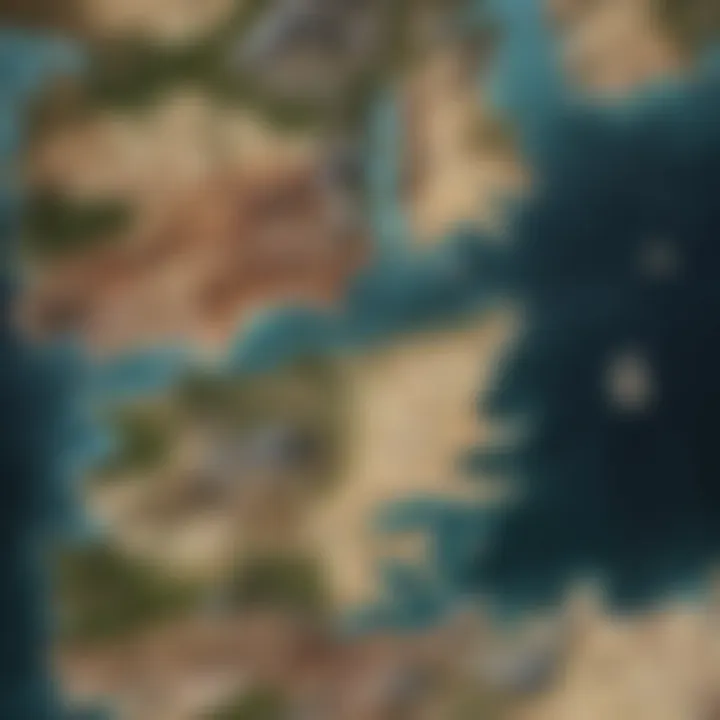The Power Struggles of Two Kings in Westeros


Intro
In the vast and tumultuous world of Westeros, where every move in the game can lead to triumph or disaster, the interplay between rulers often shapes the fate of the realm. When discussing kings in Game of Thrones, two figures stand out due to their contrasting philosophies and styles of governance: King Robert Baratheon and King Joffrey Baratheon. These two monarchs, though linked by blood, resonate on different frequencies when it comes to leadership, morality, and the burdens of kingship.
King Robert embodies the seasoned warrior, one whose reign is steeped in the lore of a once-united realm but whose own flaws create a rift in his legacy. In contrast, King Joffrey emerges from the ashes of Robert's time, a ruler defined by cruelty and the whims of a spoiled upbringing. It is crucial to take a closer look at how their reigns differ, how their styles impact those around them, and what this means for the future of Westeros.
This exploration not only shines a light on the individual characters but also illustrates how their decisions ripple through the series, affecting both allies and enemies. By examining their motivations, failures, and triumphs, we gain a deeper insight into not only the characters themselves but the very essence of power and its inherent hazards in this dangerous game. Let's delve into the essence of these kings, dissecting their intricate personalities and the forces that shaped their rule.
The Concept of Kingship in Westeros
The essence of kingship in Westeros is much more than just holding a crown or sitting upon the Iron Throne. In the world of Game of Thrones, the idea of kingship intermingles with notions of loyalty, power, and legacy. Each king's reign transforms not only their own destiny but also the very fabric of the realm. Understanding the concept of kingship provides invaluable context for the dynamics between two key figures in the narrative.
Historical Context of Monarchy
Westeros' monarchy is built on a shaky ground of bloodlines, historical grievances, and extensive allegiances. The bloody history of the Seven Kingdoms shapes its current rulers and offers insight into their motivations. The Targaryens, for instance, found their strength surged through dragons and fear, whereas the Starks have always embodied honor and loyalty to their ancestors. This backdrop of ancient conflicts and shifting allegiances provides a rich canvas to comprehend the decisions two kings might make during their reigns.
Within this historical context, we unfold layers of expectations from both the nobility and the common folk. Kings are expected not just to rule but to stabilize and protect their domains. The past reverberates throughout present-day decisions, illustrating that the shadows of former reigns still linger in the halls of power.
The Role of the Iron Throne
The Iron Throne serves as more than just a seat of power; it symbolizes the very heart of the political struggle in Westeros. To sit on the Iron Throne is to claim not only authority over the Seven Kingdoms but the responsibility that comes with it. Its creation, forged from the swords of conquered enemies, signifies the necessity of strength in the facade of nobility.
The chair’s precariousness is highlighted by its nature; it represents ambition but is also a constant reminder of the cost of the quest for power. Kings must navigate the dangerous waters of loyalty and betrayal, often making decisions that impact the peace—or chaos—across the realm. The throne’s existence challenges rulers to maintain unity, often compelling them to align with previously rival factions to secure their reign.
Symbols of Power
Symbols hold a particular weight in Westeros, acting as compelling reminders of allegiance and ambition. The crown itself, with its heavy gold and precious stones, is a broad swathe marking a king's authority. But beyond the crown, there are other potent symbols—banners, sigils, and even oaths—each one encapsulating a king’s claims and ambitions.
The Stark direwolf, the Lannister lion, and the Targaryen dragon embody not only lineage but also the characters of those who claim them. In political dialogue, these symbols can shift loyalties or spark long-held rivalries. To delve deeper into how these symbols have influenced the perceptions of both kings under consideration will reveal the escalating tensions and allegiances that drive the narrative forward.
"A king's power isn't merely in his crown but in the loyalty he inspires. Without that, he is but a man on a throne."
Thus, kingship weaves a tale of complex interactions between history, symbols, and the unyielding pursuit of influence. As we explore the journeys of the two kings in question, understanding these dynamics will shed light on their respective paths through one of the most tumultuous settings ever conceived in fantasy literature.
Introducing the Two Kings
When it comes to navigating the treacherous waters of Westerosi politics, understanding the backdrop against which two significant kings operate is paramount. This section dives into the lives of these rulers, weaving their histories, ambitions, and the intricate web of relationships that frame their reigns. By focusing on their backgrounds, we set the stage for contrasting leadership styles that will be explored later, providing a clearer picture of their choices and the ramifications of their decisions.
Background of King One
Lineage and Claim to the Throne
King One's lineage plays a great role in involving him in the great game of the Iron Throne. Born into a family with a storied history, his bloodline boasts countless warriors and leaders. This royal heritage not only grants him legitimacy but also serves as a double-edged sword. The expectation from his ancestors looms large over him, creating pressure to uphold their legacy. Additionally, his claim to the throne is bolstered by his connection to past rulers, creating opportunities for alliances and support.
A key characteristic of King One’s claim is its deep roots in traditional values. For many in Westeros, the bloodline is everything; it is a belief steeped in history and culture. This adds an element of trustworthiness to his rule, making it a popular choice among loyalists. However, this heavy reliance on lineage might also be seen as a disadvantage in a landscape that values shrewd political acumen and adaptability over mere birthright. Thus, while his heritage is an asset, it also constrains him in ways that could have unforeseen consequences.
Early Reign and Key Alliances
Entering the throne amidst political upheaval, King One’s early reign is characterized by a series of calculated alliances. Recognizing the fragility of his position, he aligns himself with powerful factions who can provide him the stability he desperately needs. These alliances are strategic, sealing bonds with influential houses that prop up his rule while also ensuring he can counter any threats from rival claimants.
The duality of his initial approach allows him to act with both decisiveness and caution. Yet, there lies a unique feature in how he navigates these relationships; he manages to instill a sense of loyalty among his supporters, not merely through power but through mutual benefit. This choice proves beneficial since it creates a united front against any potential adversaries. Nevertheless, such alliances can become a liability if unexpected betrayals or shifting loyalties occur, leaving him precariously balanced on a knife's edge.


Background of King Two
Family Heritage and Ambitions
In stark contrast, King Two emerges from a family heritage that is marked by wild ambition and unyielding drive. His lineage reflects that of both nobility and turmoil, for his ancestors have fought tooth and nail for the crown, famously flipping allegiances and causing chaos along the way. Such an upbringing shapes his character, making him not just a ruler but a calculated player in the game of thrones.
The ambition that runs through his bloodline fuels King Two's desire to carve his own legacy distinct from those of his forebears. His key characteristic is that he conflates personal aspiration with public duty; he truly believes that only through claiming the throne can he save the realm from itself. The unique feature of his heritage—rich in struggle—is both an asset and a burden. While it molds him into a resilient leader, it also leaves the impression that his motivations could be driven more by personal achievement than genuine concern for his people.
Political Maneuverings and Initial Challenges
From the outset, King Two's reign comes with its own set of hurdles. His ambitious nature necessitated a range of political maneuverings to consolidate power, often stepping on toes along the way. The early challenges include dissent from the nobility and discontent among the common folk—a reminder that ruling is not merely about seizing power but maintaining it. King Two's strategy leans heavily on manipulation and cunning, elements that might make him appear ruthless.
One key characteristic of King Two’s efforts is his ability to pivot quickly in response to threats. When faced with opposition, he rarely hesitates to employ bold tactics, and his old habit of bending rules to suit his needs comes to play. But such approaches can backfire, especially when he courts danger through too many alliances or forges agreements with those known for treachery. While this could position him well to seize opportunities, the potential for isolation grows more prominent, especially if he is perceived as a threat by those he relies upon.
Contrasting Leadership Styles
In the Game of Thrones universe, the approach to leadership can significantly determine the fate of a kingdom. This section explores the differing methods employed by two kings, each possessing distinct styles that shape their reigns and influence their subjects. The examination of contrasting leadership styles offers valuable insights into their effectiveness and the subsequent impact on their realms. By analyzing the core traits and strategies of each ruler, we reveal how these approaches not only define their individual characters but also cast long shadows over the future of Westeros.
King One's Approach to Governance
Decisiveness and Strategy
King One distinguished himself through his remarkable decisiveness and strategic foresight. In a world where hesitation can lead to destruction, his ability to make clear and firm decisions set him apart as a ruler. This decisive nature remained integral to his responsiveness against threats and challenges, allowing him to swiftly navigate the complexities of power struggles.
The key characteristic of King One's decisiveness is his preference for clear plans and immediate actions. Such an approach fosters confidence among his subjects, as it showcases a leader who does not dilly-dally when critical actions are needed. This is particularly advantageous in high-stakes situations where uncertainty reigns and bold moves are often necessary.
However, this decisiveness also comes with its drawbacks. While quick decisions can yield immediate results, they might sometimes overlook broader consequences or insights. A well-thought-out strategy is undeniably beneficial but can also become rigid, not allowing for adaptability in face of changing circumstances.
Use of Influence and Networking
Another hallmark of King One's reign is his adept use of influence and networking. He understood that alliances were the bedrock of stability in the harsh terrain of Westeros. By forging connections and building a web of loyal supporters, he managed to strengthen his position and ensure his security.
The unique feature of this approach lies in its ability to create a supportive ecosystem around the crown. Influential families and allies serve as an extension of power, lending credibility to his rule. This not only protects the throne but also amplifies King One's reach across the realm.
However, this reliance on influence can backfire. As loyalties shift and power dynamics evolve, the threads of networking may fray. King One must remain vigilant, for the very relationships he cultivates could also become sources of betrayal if they are not managed carefully.
King Two's Method of Rule
Emotion and Personal Relationships
In contrast to King One, King Two engages his subjects on a deeply personal level through emotion and personal relationships. His methods are often characterized by a more empathetic touch, fostering connections that resonate with the populace. This approach enables him to create a profound bond with his followers, who are likely to feel valued and heard under his rule.
The strength of this method lies in its ability to evoke loyalty from his subjects. When people feel they have a personal stake in their leader's success, they are more inclined to support him, even through turbulent times. This emotional connection serves as a powerful motivator, often leading to a unified front during crises, which can be crucial in conflicts.
Nonetheless, the personal nature of King Two's leadership style carries its challenges. Emotional ties can cloud judgment, making it harder to make impartial decisions when necessary. Additionally, if personal relationships sour or betrayals occur, they can lead to significant upheaval within the kingdom.
Rhetoric and Persuasion
King Two’s adeptness with rhetoric and persuasion is another defining aspect of his rule. He wields words like a seasoned swordsman, using them to inspire and mobilize people towards collective goals. His speeches are often filled with passionate rhetoric that stirs the hearts of his subjects.
This characteristic of King Two is particularly beneficial, as it helps him shape the narrative around his reign. By framing his decisions in a light that resonates with his audience, he can effectively gain support and turn public sentiment in his favor.
However, this reliance on rhetorical skills can be double-edged. If the message is not backed by action, it risks appearing disingenuous, leading to disillusionment among supporters. Moreover, persuasive rhetoric can sometimes overshadow the complexities of realpolitik, which must also be addressed for sustainable governance.


"Words are wind," as a saying in Westeros goes, but in the hands of King Two, they become the very tools that carve the path toward unity—or discord.
By contrasting the leadership styles of both kings, we gain a clearer understanding of their effectiveness in shaping their kingdoms. The distinct methodologies not only reflect their personalities but also play a pivotal role in determining their legacies and the welfare of their realms.
The Impact of Their Decisions
In the tumultuous landscape of Westeros, the choices made by kings resonate far beyond the hallways of their castles. Decisions of these rulers often stir waves that can either uplift a kingdom or shatter it into pieces. In this examination, the focus is on how two kings' contrasting styles and choices impact the realm's stability and the lives of their subjects. The dynamic interplay of political maneuvering, emotional intelligence, and strategic foresight creates a backdrop for understanding the various facets of leadership.
Major Conflicts and Resolutions
The Battle for Allegiance
The Battle for Allegiance represents a critical juncture in the power struggles during these kings' reigns. This conflict is not merely a physical confrontation; it's a struggle for trust and loyalty, essential elements in maintaining power in a realm where betrayal lurks around every corner. For our kings, securing the allegiance of powerful lords and influential factions defines their strength.
The key characteristic of this battle lies in its duality—while it can forge strong alliances, it can equally lead to significant rivalries. This aspect serves as a mirror reflecting the kings' individual approaches to leadership. King One, known for his tactical decisiveness, often emphasized strategic gifts and promises of wealth as tools to sway allegiances. King Two, on the contrary, approached this battle through emotional connections, employing personal relationships to forge bonds.
The beneficial consequence of understanding this battle is its ability to unpack the psychological layers of kingship. Each decision serves a unique purpose, influencing not just immediate outcomes but creating long-lasting ties or rifts. However, the challenge is to balance authority with empathy; overestimation of either can lead to downfall.
Tactical Blunders and Miscalculations
When discussing the impact of a ruler's decisions, the spotlight inevitably falls on Tactical Blunders and Miscalculations. These moments often punctuate the otherwise grand narrative of a king's reign. They are, in many ways, the lifeblood of storytelling in the Game of Thrones universe. Missteps, whether in battle tactics or political negotiations, can redefine a king's legacy.
The hallmark of these blunders is their ability to pivot the course of history in unexpected directions. For instance, King One's overreach in sending troops to quell a distant rebellion resulted in a catastrophic loss, weakening his position. On the other hand, King Two’s misjudgments in coalition-building exposed him to rival factions, creating fractures among his supporters. Such pitfalls highlight the intricate dance of power, where the slightest miscalculation can lead to ruin.
By documenting these failures, the article sheds light on how leaders learn (or fail to learn) from their experiences. Each tactical error not only shapes immediate outcomes but also casts a long shadow on the governing styles of both kings, enriching their narrative complexity but also serving as a cautionary tale.
Affect on the Realm's Stability
Public Sentiment and Revolts
Public Sentiment and Revolts serve as the barometer for measuring the effectiveness of a king's decisions. In a culture where the common folk's voice may seem minuscule compared to the upper echelons of society, the weight of collective sentiment can prompt seismic shifts in power dynamics. When a ruler fails to heed the cries of the people, unrest brews and bursts forth.
The pivotal element to consider here is the direct link between a king’s decisions, public satisfaction, and socio-political stability. King One’s heavy-handed approach led to widespread discontent, ultimately culminating in uprisings that rocked the heart of his domain. Conversely, King Two, who focused on fostering goodwill and understanding among the populace, enjoyed a relative peace, demonstrating how a ruler’s relationship with his subjects can determine a kingdom's fate.
Recognizing this dynamic underscores the importance of governance that is attuned to the needs of the people. However, mismanaging public sentiment can incur dangerous repercussions, laying bare the fragile nature of monarchic rule.
Long-term Consequences on Governance
Exploring Long-term Consequences on Governance paints a comprehensive picture of how decisions ripple through time. Some choices echo in history, shaping not only a king's immediate circumstances but also influencing future governance practices. A ruler’s approach to crisis, alliance-building, or even conflict resolution can set precedents for years to come.
The more profound aspect of these consequences is their capacity to mold the governance landscape of the realm. King One's downfall resulted in a power vacuum that led to a chaotic scramble for power among aspiring lords. In contrast, King Two's tenure, marked by attempts at reform and stabilization, created a legacy of resilience that lasted beyond his rule.
This perceived stability lends credibility to contemporary governance models and creates frameworks for future leaders. The essential lesson lies in how the choices of one era carry implications for subsequent generations, making an understanding of past rulers’ impacts crucial for navigating the challenges of the present and the future.
"In the end, the spectrum of a king's choices reflects not just personal ideology but echoes through the corridors of history, dictating the fate of kingdoms."
By exploring these dimensions—conflicts, public sentiment, and governance repercussions—we can piece together a richer understanding of how two kings shape their world in crucial, lasting ways.
Personal Lives of the Kings
Understanding the personal lives of the kings in the Game of Thrones universe is essential, as it profoundly influences their decisions and leadership styles. These personal dynamics often intertwine with the political landscape of Westeros, offering insights into their motivations, weaknesses, and strengths. The way they interact with their families shapes not only their reigns but also creates ripples throughout the realm, impacting alliances, power struggles, and ultimately, their legacies. By examining the familial ties and relationships of these rulers, one can uncover the heart of their kingship, providing a nuanced view of who they are beyond their crowns.


Family Dynamics of King One
Relationship with Heirs
The relationship that King One shares with his heirs speaks volumes about his governance style. This dynamic isn't just a simple lineage; it's about the aspirations, expectations, and emotional ties that come into play. King One’s commitment to nurturing a strong bond with his children shows his inclination towards forging capable leaders for the future. His heirs aren't just a continuation of his bloodline; they are potential allies or rivals, depending on how well he prepares them for the complexities of ruling.
This focus on relationships can be seen as a strategic advantage, strengthening loyalty and ensuring that they feel a sense of duty towards the crown. However, such closeness can also become a double-edged sword. If perceived as favoritism, it can breed resentment among other members of the court or siblings, leading to power struggles that can weigh heavily on the monarchy.
Influence of Spousal Relations
In any royal household, the influence of spousal relations cannot be overstated. For King One, his partnership with his spouse is not only a personal bond; it's a crucial political alliance. The support, advice, and sometimes intervention of a king's consort can shape policy and diplomacy. King One’s careful navigation of these relations highlights the importance of mutual respect and shared power in enhancing the realm’s stability.
The key feature here is the balance of power within the marriage; his spouse’s background and connections often serve to solidify alliances with other noble families. However, if this relationship falters, it can cause chaos within the court and undermine his authority. The interplay of love and duty remains a significant theme, determining how effectively they can rule together.
Family Dynamics of King Two
Lineage and Succession
Lineage and succession for King Two present a complicated narrative. In his case, the line of succession is not merely about blood; it embodies the tensions and history between the families involved. This is a king trying to stabilize his dynasty while managing the expectations that come with his heritage. Understanding his lineage is crucial to grasping the alliances he must forge to maintain his hold on the throne.
One characteristic of this approach is the emphasis on legitimacy in ruling. King Two seeks to affirm his right to rule through both blood and merit, pushing for policies that empower his direct descendants. Unfortunately, these decisions can sometimes alienate influential houses or even his own kin, leading to internal friction that threatens to unravel his reign.
Impact of Personal Losses
The personal losses that King Two endures could have far-reaching effects on his reign. Dealing with grief often translates into either a deepened resolve or a spiraling instability. In King Two's case, each loss transforms into a heavy burden, coloring his decisions and altering his leadership approach. This grief doesn't just stay personal; it seeps into his political life, creating an air of unpredictability that challenges both his governance and the stability of his realm.
This aspect stands out because of its raw emotional weight, making him relatable yet unpredictable. The tragic events can rally support from the public, offering a narrative of resilience and a cause for solidarity or, conversely, could lead to a perception of weakness, inciting rivals to exploit his vulnerability.
"The personal lives of kings are the unseen forces driving their legacies, where each decision leans heavily on their history and relationships."
Navigating the complexities of personal life alongside the demands of kingship reveals the multi-layered nature of power. Understanding these threads brings about a richer perspective on the broader conundrum of leadership in a fierce and uncertain world.
Legacy and Memory
The legacy and memory of the characters in the Game of Thrones universe carry immense weight. These not only serve as reflections of the actions taken by the kings but also shape the perceptions that future generations will have about their reigns. Each King leaves behind a unique imprint, not merely through deeds on the battlefield or decisions made in court. Instead, the survival of their ideals, missteps, or triumphs form a narrative that extends beyond their lifetimes. In essence, this section highlights how history interprets the legacies of these rulers and how their memories influence subsequent political landscapes.
King One's Historical Reputation
Portrayal in Subsequent Lore
The portrayal of King One in subsequent lore presents a multifaceted image of his character. While his power and strategic decisions are often lauded, there exists a distinct undercurrent of criticism regarding his moral compass. Histories past reflect on his reign with a blend of admiration and disdain, leading to an intricate tapestry of narratives shaped by various storytellers. This duality offers a unique lens through which readers can discern the conditionality of power. The tale of King One serves the overall topic by illustrating how leaders are often trapped in the legacies they construct themselves while also allowing the populace to write their own conclusions about what kind of ruler he was.
Recognition and Criticism from Historians
Historians frequently grapple with the recognition and criticism of King One's reign. They are often torn between the dissection of his accomplishments and the ethical implications of his decisions. This characteristic of modern historiography adds depth and contributes significantly to the understanding of the king's legacy. Historians often engage in heated debates, scrutinizing his policies while weighing their long-term impacts. The fierce discourse surrounding King One is beneficial because it showcases the complexity of historical narratives; no figure exists without shadow. However, simplifying his contributions, overlooking his flaws, risks crafting a one-dimensional narrative that fails to capture the essence of his rule.
King Two's Legacy in the Eyes of History
Lessons Learned from his Rule
King Two has become a beacon of lessons learned, especially for those scrutinizing the pitfalls and triumphs of leadership. His reign teaches us vital truths about the necessity of emotional intelligence and empathetic governance. Unlike the often cold and calculating style of King One, King Two’s inclination towards personal relationships allows for a more nuanced approach to rulership. This focus on human connection can be viewed as both a strategic advantage and a potential downfall, depending on context. In a way, King Two's approach is a beneficial addition to the discussion as it highlights the importance of interpersonal dynamics in power politics, showing that being a king isn’t merely about strength but also about heart.
The Duality of His Memory
The duality of King Two’s memory fosters reflections that oscillate between admiration and skepticism. Histories describe a ruler who inspired loyalty while also facing backlash for his emotional decisions. This ambivalence provides fertile ground for future interpretation of his legacy. While many will remember the graciousness of his leadership, others might focus sharply on mistakes made in the heat of passion. This plurality in representation helps reinforce the notion that memory is pliable, shaped by perspective and narrative. Such a characteristic is advantageous as it invites ongoing dialogue about the nuances of leadership while also indicating that every ruler's legacy is subject to reinterpretation as socio-political contexts change over time.
"The tales we tell of our kings are not only reflections of their actions but also mirrors of our own societal values and shifting beliefs."
In summation, the ways in which King One and King Two are remembered ultimately illustrate both the permanence and transience of legacy in the Game of Thrones universe, urging us to consider how history is written and, more crucially, rewritten.



